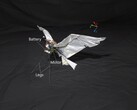While neurotechnology companies like Neuralink are working hard on human brain-computer interfaces (BCI), Russian company Neiry has been working on something straight out of science fiction — remote-controlled pigeons.
In a recent official announcement, the company revealed it has successfully conducted flight tests of what it calls "biodrones" in Moscow. The technology turns ordinary birds into controllable flight units using a combination of miniature backpack-mounted electronics and neural implants.
The system bypasses the need for traditional animal training. Instead, surgeons use a stereotactic setup to implant electrodes into specific brain regions. These connect to a solar-powered stimulation unit on the bird's back. To steer the bird, the system sends electrical impulses that influence the bird's brain, effectively making the bird believe it wants to fly in the commanded direction. Navigation is handled via onboard GPS.
Neiry claims this approach offers a massive advantage over mechanical rivals. The company states the PJN-1 pigeons can cover 310 miles a day, providing range and endurance hundreds of times greater than conventional electric drones.
The developers are currently testing flight characteristics and plan to adapt the tech to ravens and albatrosses for heavier payloads. The intended applications include monitoring power lines, conducting environmental surveys, and aiding in search-and-rescue missions, with onboard cameras using AI to blur faces for privacy compliance.











